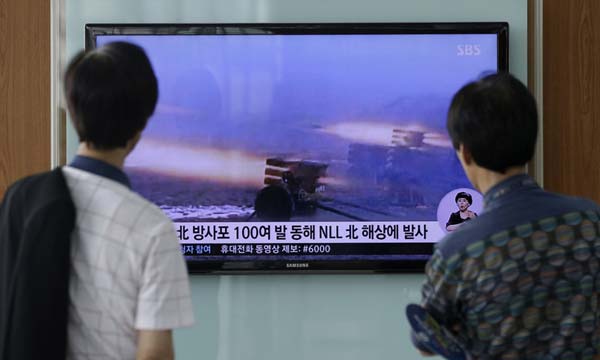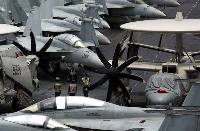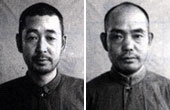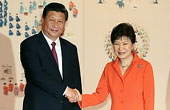DPRK fires some 100 shells into eastern waters
(Xinhua) Updated: 2014-07-14 16:12
 |
|
People watch a TV news program reporting on DPRK's artillery shells at Seoul Railway Station in Seoul, South Korea, July 14, 2014. The superimposed letters on the screen read: " North Korea fired about 100 artillery shells into NLL North Korea area on east sea". [Photo/IC] |
SEOUL - The Democratic People's Republic of Korea (DPRK) on Monday fired some 100 rounds of artillery shells into its eastern waters from a region just north of the military demarcation line, officials at the Republic of Korea (ROK) military said.
A Defense Ministry official told Xinhua on the phone that the DPRK launched artillery shells from the region some hundreds of meters north of the Demilitarized Zone in Goseong, a ROK border town around 220 km northeast of Seoul.
 |
| US aircraft carrier to make port call to S.Korea |
Another official at the Joint Chiefs of Staff said that some 100 rounds were launched, but he noted that how many would be fired had yet to be confirmed as the firing exercise was believed to be under way.
The official said the ROK military strengthened vigilance and defense readiness against additional firings.
The shells were believed to be fired from the 122-caliber multiple-rocket launchers with a range of 10-20 km.
It was the DPRK's 15th launch of missiles or artillery shells this year. The DPRK launched more than 90 short- and medium-range missiles and shells since Feb. 21.
It was rare for the DPRK to conduct firing exercise just north of the military demarcation line in the east coast.
Pyongyang recently escalated tensions on the Korean Peninsula by firing missiles and shells five times in less than three weeks.
On July 13, the DPRK fired two short-range ballistic missiles, presumed to be Scud, into the eastern waters from the northern area of its southern border city of Kaesong, some 20 km north of the military demarcation line. The missiles flew about 500 km.
The DPRK also fired two short-range missiles, also presumed to be Scud, from a site in Hwanghae Province, some 40 km north of the military demarcation line, in a northeasterly direction into its eastern waters on July 9.
The DPRK launched two Scud missiles, which flew 500 km, into its east waters on June 29 after firing three KN-09 shells with a range of 190 km on June 26.
A ROK government source was quoted by local media as saying that South Korea and the United States will raise the issue of the DPRK's recent missile launches with the UN Security Council.
The launches came ahead of a joint maritime exercise that will involve US aircraft carrier USS George Washington and ROK battleships in southern and southwestern waters off the Korean Peninsula from July 16 to July 21.
After the six-day drill, South Korea, the United States and Japan will hold a joint naval exercise, called Search and Rescue Exercise or SAREX, from July 21 to July 22 in international waters south of ROK's southern resort island of Jeju.
The exercise will mobilize the USS George Washington, three ships and an aircraft form the United States, two ships and an aircraft from ROK, and a ship and an aircraft from Japan.
Tensions were feared to escalate further on the Korean Peninsula. On July 1, the ROK refused a proposal of the DPRK to stop all military hostilities, a day after Pyongyang called for Seoul to scrap this year's Ulchi Freedom Guardian military exercise between Seoul and Washington slated for August.
On July 7, the DPRK called for ending reckless hostility and confrontation between the two Koreas, asking the ROK to stop all kinds of DPRK-targeted military exercises it plans to conduct with "outsiders."
Later that day, the ROK made a response to the call, saying the DPRK should stop unreasonable claims that its nuclear weapons program would guarantee peace and prosperity of the Korean Peninsula, actually denying the call once again.
As part of a conciliatory gesture, the DPRK said it will send some 150 athletes and a large cheering squad to the upcoming Asian Games, which will be held in ROK's western port city of Incheon from Sept. 19 to Oct. 4.
The two nations agreed to hold working-level talks on July 17 about the DPRK's participation in the Asiad.
During the talks, the two sides are expected to discuss various issues, including how the DPRK sports delegation and the cheering squad will move in Incheon, how much the ROK will pay for their stay and whether the two nations will march together at the opening ceremony or cheer together for the multisport event.
- DPRK fires 2 missiles into sea
- DPRK denounces US, S Korea for joint naval drill
- US aircraft carrier to make port call to S.Korea
- ROK hints at easing May 24 sanctions on DPRK
- DPRK proposes meeting with ROK on Asian Games
- Six Japanese opposition lawmakers leave for DPRK
- China supports improvement of DPRK-ROK ties










